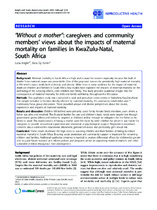| dc.contributor.author | Knight, Lucia | |
| dc.contributor.author | Yamin, Alicia Ely | |
| dc.date.accessioned | 2016-09-21T07:39:43Z | |
| dc.date.available | 2016-09-21T07:39:43Z | |
| dc.date.issued | 2015 | |
| dc.identifier.citation | Knight, L. and Yamin, A. (2015). “Without a mother”: caregivers and community members’ views about the impacts of maternal mortality on families in KwaZulu-Natal, South Africa. Reproductive Health, 12(1): S5 | en_US |
| dc.identifier.issn | 1742-4755 | |
| dc.identifier.uri | http://hdl.handle.net/10566/2423 | |
| dc.identifier.uri | http://dx.doi.org/10.1186/1742-4755-12-S1-S5 | |
| dc.description.abstract | BACKGROUND: Maternal mortality in South Africa is high and a cause for concern especially because the bulk of deaths from maternal causes are preventable. One of the proposed reasons for persistently high maternal mortality is HIV which causes death both indirectly and directly. While there is some evidence for the impact of maternal death on children and families in South Africa, few studies have explored the impacts of maternal mortality on the well-being of the surviving infants, older children and family. This study provides qualitative insight into the consequences of maternal mortality for child and family well-being throughout the life-course.
METHODS: This qualitative study was conducted in rural and peri-urban communities in Vulindlela, KwaZulu-Natal. The sample included 22 families directly affected by maternal mortality, 15 community stakeholders and 7 community focus group discussions. These provided unique and diverse perspectives about the causes, experiences and impacts of maternal mortality.
RESULTS AND DISCUSSION: Children left behind were primarily cared for by female family members, even where a father was alive and involved. The financial burden for care and children’s basic needs were largely met through government grants (direct and indirectly targeted at children) and/or through an obligation for the father or his family to assist. The repercussions of losing a mother were felt more by older children for whom it was harder for caregivers to provide educational supervision and emotional or psychological support. Respondents expressed concerns about adolescent’s educational attainment, general behaviour and particularly girl’s sexual risk.
CONCLUSION: These results illuminate the high costs to surviving children and their families of failing to reduce maternal mortality in South Africa. Ensuring social protection and community support is important for remaining children and families. Additional qualitative evidence is needed to explore differential effects for children by gender and to guide future research and inform policies and programs aimed at supporting maternal orphans and other vulnerable children throughout their development. | en_US |
| dc.language.iso | en | en_US |
| dc.publisher | BioMed Central | en_US |
| dc.rights | © 2015 Knight and Yamin; licensee BioMed Central Ltd. This is an Open Access article distributed under the terms of the Creative
Commons Attribution License (http://creativecommons.org/licenses/by/4.0), which permits unrestricted use, distribution, and
reproduction in any medium, provided the original work is properly cited. | |
| dc.subject | South Africa | en_US |
| dc.subject | Maternal mortality | en_US |
| dc.subject | Orphaned children | en_US |
| dc.subject | Family impact | en_US |
| dc.title | “Without a mother”: caregivers and community members’ views about the impacts of maternal mortality on families in KwaZulu-Natal, South Africa. | en_US |
| dc.type | Article | en_US |
| dc.privacy.showsubmitter | false | |
| dc.status.ispeerreviewed | true | |
| dc.description.accreditation | Web of Science | en_US |

